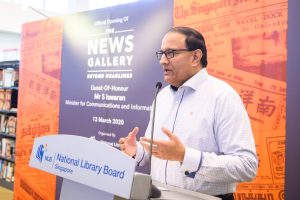Singapore’s former transport minister has been charged with multiple offenses including corruption and obtaining valuables as a public servant, seven months after the government announced that he was under investigation.
The charges against S Iswaran, 61, were announced in a hearing at the State Courts of Singapore this morning, Channel News Asia reported. He faces 27 charges: two of corruption under the Prevention of Corruption Act, one of obstructing justice, and 24 of obtaining valuables as a public servant under the Penal Code. He pleaded not guilty to all charges.
In a statement today, Prime Minister Lee Hsien Loong said that Iswaran had submitted his resignation to him on Tuesday, “after the Corrupt Practices Investigation Bureau [CPIB] had given Mr Iswaran formal notice of the charges.” Iswaran has resigned both from the cabinet and from his seat in Parliament. In his response, Lee wrote that he was “disappointed and saddened” that Iswaran was leaving politics in such circumstances, but said that “it was essential that [he] deal with such matters rigorously in accordance with the law.”
Iswaran was arrested along with hotel tycoon Ong Beng Seng in July, after Lee approved an investigation into their conduct. However, the CPIB did not divulge the exact accusations against the pair.
As the Business Times reported, the first corruption charge alleges that Iswaran corruptly obtained S$145,434 ($188,233) worth of tickets to the 2022 Singapore Formula 1 Grand Prix tickets from Ong, the chairman of race promoter Singapore GP. These “gratifications” were allegedly offered in exchange for advancing Ong’s business interests relating to a contract between Singapore GP and the Singapore Tourism Board.
The second corruption charge alleges that Iswaran received private jet and business class flights to and from Doha, and a night at the Four Seasons Doha, through Singapore GP. This is alleged to have been offered in return for “advancing Ong’s interests in matters relating to a contract between Singapore GP and STB, as well as a proposed contract with STB to establish the ABBA Voyage virtual concert in Singapore.”
The charge of obstructing justice involves Iswaran’s alleged repayment of S$5,700 ($4,242) to Singapore GP in May of last year, which was intended to reimburse the cost of the business flight ticket from Doha to Singapore.
The remaining 24 charges are for obtaining valuable items as a public servant. All of these involved tickets to exclusive events, including the Singapore Grand Prix, Premier League football matches, and West End theater productions. He is alleged to have received all of these from Ong, via Singapore GP or through his company Como Holdings (UK) Limited.
Iswaran was first elected as a member of Parliament in 1997, in a group representation constituency on the western side of Singapore island, and played an important role in bringing Formula 1 racing to Singapore in 2008. He was appointed minister for transport in May 2021.
The case marks the first time in nearly four decades that a cabinet minister has been investigated, let alone charged, with corruption. As one observer noted on X (formerly Twitter), the last to be investigated was Minister for National Development Teh Cheang Wan in 1986.
As the CPIB recalls on its website, Teh “was investigated for accepting bribes totaling $1 million from two private companies for helping them retain and buy over a piece of state land for private development.” Before being formally charged, however, he committed suicide, leaving a letter to then Prime Minister Lee Kuan Yew expressing his remorse and stating that he should “pay the highest price for his mistake.”
The infrequency of these cases speaks to the successes that Singapore has had in taming corruption. It has done so in large part by offering civil servants unusually high salaries while making the punishments for corruption correspondingly harsh. While the total value of the alleged amount obtained by Iswaran is hardly astronomical, especially by the prevailing regional standards, it remains unclear if the judges will take this into account in the event of his conviction. Given the People’s Action Party’s strict no-tolerance attitude toward corruption, and its determination to uphold its reputation for squeaky-clean and frictionless governance, there is an equal chance that the court makes an example of him.
If found guilty of all of the charges, Iswaran could conceivably spend the rest of his life behind bars. The charge of “corruptly obtaining gratification” under the Prevention of Corruption Act carries up to seven years in prison, as does the obstruction of justice charge. Each of the 24 charges of obtaining a valuable thing as a public servant carries prison terms of up to two years.

































